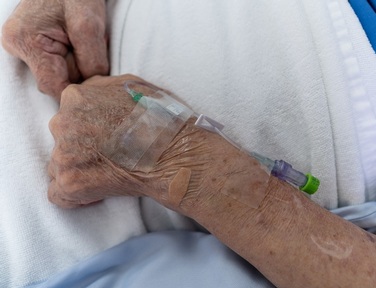Coronavirus: Dementia charity accuses Boris of being 'dangerously complacent'
The Alzheimer’s Society has accused Boris Johnson of ‘being dangerously complacent’ when he said there had been 'palpable improvement' in the number of COVID-19 related care home deaths.

There were 6,391 COVID-19 deaths in care homes in England between 10 April and 1 May, which is when the Care Quality Commission started collecting the data.
Separate ONS figures for England and Wales reveal there were 5,890 coronavirus-related care home deaths registered up to 24 April. This is up from over 3,000 the week before.
After the Labour leader Kier Starmer at Prime Minister's Questions accused the Prime Minister of failing to “get to grips” , Boris Johnson said he “bitterly regrets” the crisis in care homes and that a 'huge effort' was going on.
Alzheimer’s Society head of policy, Gavin Terry refuted the claims made by Mr Johnson saying he has not seen any evidence to suggest that deaths in care homes are slowing down, and any other implication would be “dangerously complacent.”
Mr Terry said: “In the past month, we know that the number of people who have died in care homes is twice the average; in the last week alone, we saw the death rate rise by 30 per cent.
"And it is not only deaths due to coronavirus that we fear - we are concerned there will be a sharp rise in deaths due to dementia, not least because of the impact of isolation, when the full figures are known."
He added: "It is a terribly worrying time for everyone with dementia and their families, and we hear heart-breaking stories every day via our Dementia Connect support line from people anxious about the safety of their loved ones in care homes."
Survey finds only 22 per cent of care workers tested
Mr Terry also raised concerns regarding testing. He said: “Care staff and residents must get the regular testing they need, and adequate personal protective equipment must be available to every home until this virus is really under control.”
A survey of National Care Forum (NCF) members, which between them employ 31,262 staff, found only 22 per cent of the 6,469 care workers identified as being a priority for testing, due to having symptoms, were actually tested.
The survey also shows the employer portal is not working for social care employers. Using this route only two per cent (138 out of 6,469) of staff were able to receive a test at drive-through centres, with no home testing being available on the system.
In response to the survey, Vic Rayner executive director of the NCF said: “The government’s promise to provide tests for all staff is exposed as pure words. Social care needs to be systematically prioritised in each and every testing system, in order for government to live up to its commitment.”
The self-referral portal appeared to prove more successful with 583 staff managing to get a test via this route. Out of this number, 546 attended drive-through appointments, but only 37 received home testing kits. This route, whilst proving more successful, only enabled nine per cent of the staff who needed testing to obtain a test.
A total of 715 employees were able to access testing through local testing systems, making it the most successful testing route. This was highly variable depending on where social care providers are based in the country. However, this is only 11 per cent of the total number of staff who need testing (715 out of 6,469).
Ms Rayner said: “We are calling for the prioritisation of social care employers through the Getting Tested Portal to ensure they have a strategic and targeted prioritisation of all their employees – regardless of symptoms as previously promised by the government and for social care workers to be given priority status on the self-referral portal.”
Latest News
 29-Jul-24
Dementia Bus gives carehome.co.uk staff insight into life with dementia
29-Jul-24
Dementia Bus gives carehome.co.uk staff insight into life with dementia
 01-Mar-24
Find out the top care homes in 2024
01-Mar-24
Find out the top care homes in 2024
 21-Mar-23
UK's top care homes in 2023 revealed
21-Mar-23
UK's top care homes in 2023 revealed
 03-Jan-23
carehome.co.uk launches free care helpline
03-Jan-23
carehome.co.uk launches free care helpline
 13-Dec-22
5 mins with Emily Whitehurst, chief operating officer for Constantia Healthcare
13-Dec-22
5 mins with Emily Whitehurst, chief operating officer for Constantia Healthcare